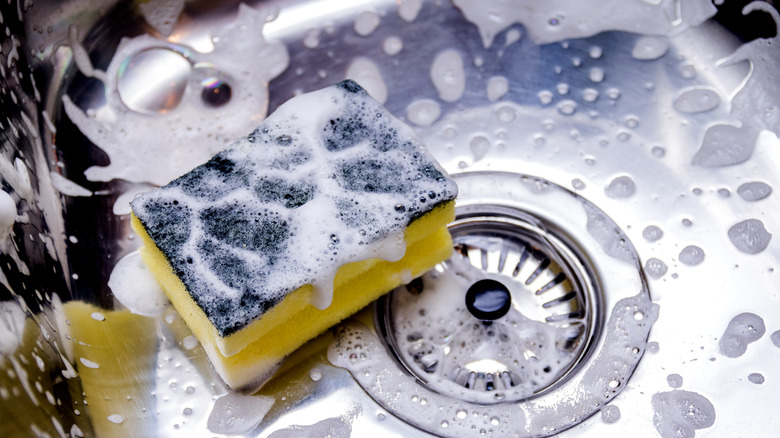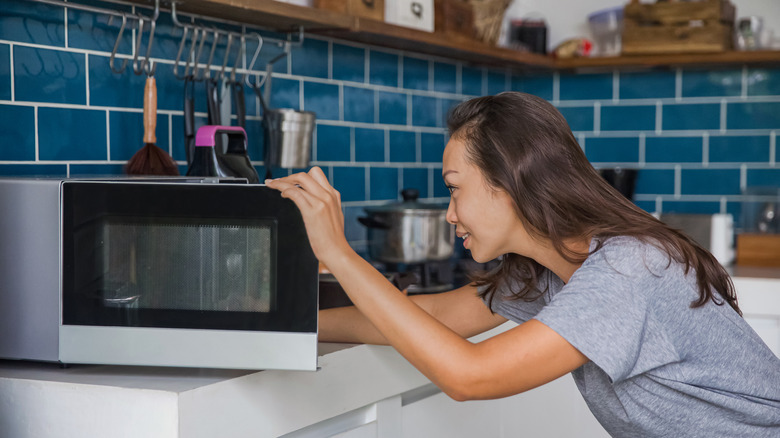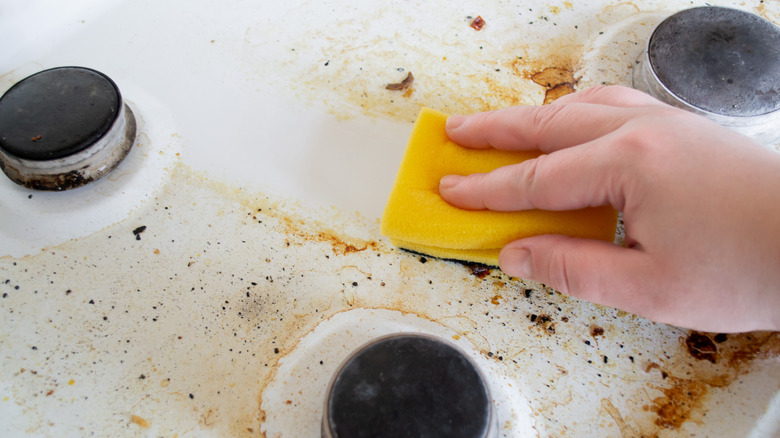Can Lemon Juice Really Keep Your Kitchen Sponges Sanitized?
Whether it's wiping down the stovetop, scrubbing a pan, or cleaning out the sink, you know you can always depend on your trusty kitchen sponge for a number of needs; unfortunately, that innocuous-looking cleaning aid is probably a safe haven for bacteria and foul odors. In fact, in a 2017 study published in Scientific Reports, researchers found that unassuming kitchen sponges could contain 45 billion bacteria in a square centimeter. Before you throw away your scrubbing buddy, however, could a common kitchen essential in your fridge be the solution to keeping your smelly sponge clean?
Lemons have long been loved for their ability to fight bacteria and neutralize odors — two things that your yellow kitchen sponge is in desperate need of. But is lemon juice really strong enough to kill off billions of bacteria per square centimeter? While lemon juice has been found effective in neutralizing odors and fighting off a large percentage of bacteria found in kitchen sponges (between 37 to 87%, per the Agricultural Research Service), it still leaves behind substantial amounts, which can pose a threat to your household. What does this mean? Soaking your sponge in lemon juice — although it may kill off significant populations of bacteria — is not a tenable option for sanitizing it.
How to actually sanitize kitchen sponges
There is still hope for your grimy cleaning assistant — even if lemon juice alone falls flat as a sanitizer — and it can be found in the kitchen. Anyone who owns a microwave also possesses a powerful sterilization tool that can leave your sponge virtually bacteria-free in one minute.
To begin, grab your kitchen sponge and wet it thoroughly (if there are any dry portions, you will risk it igniting in the microwave). Squeeze out the excess water so that it is not dripping and put the sponge in the microwave for 60 seconds. After cooking the sponge, let it cool off sufficiently prior to removing it — up to 15 minutes — to prevent getting burned. While the microwave will sanitize your sponge, it won't necessarily make it smell amazing. In order to take your sponge cleaning to the next level, you can easily make use of lemon juice's citric acid as a deodorizer by soaking your sponge in a mixture of lemon juice and water before microwaving it.
Sponge safety
Even with these seemingly extreme sanitization tactics, your kitchen sponge is not long for this world; to be safe, you should plan to replace yours every week. Why, you may ask? Because sponges that have been sanitized frequently and on a regular basis have actually been found to harbor more resistant bacteria that is stronger than the easily-killed-off strains your microwave can eliminate, according to the 2017 Scientific Reports study.
In order to achieve the cleanest kitchen possible, sanitize your sponges every one to two days, as outlined above. When you reach the end of the week, you should replace your kitchen sponge and bring a brand new one into rotation. If going through 52 sponges a year feels too wasteful, you may want to consider an alternative to conventional kitchen sponges. Silicone sponges are non-porous and are therefore not susceptible to bacteria becoming lodged within their fibers. While they are not as abrasive as traditional sponges, they can effectively scrub your dishes to help remove cooked-on food and other debris.


